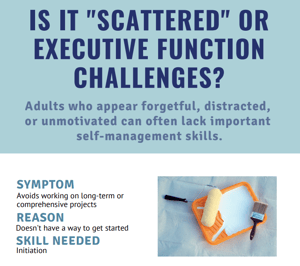Most people would agree that Mondays can be lousy. But the one thing Monday’s got  going for it is that we think of Mondays as “work days,” and when we’ve already got work on the brain it can make getting started on our work a little easier.
going for it is that we think of Mondays as “work days,” and when we’ve already got work on the brain it can make getting started on our work a little easier.
But Sundays are a whole other story.
Before I even knew what an Executive Function skill was, my Sundays were a haphazard mess. On a day I had to grade papers, go to the grocery store, do laundry, vacuum, and get snacks ready for the Patriots game at 4:25, I was frantic. I struggled to figure out what my priorities were and how to get everything done before kick-off. Oftentimes, this meant waking up at what many would consider an ungodly hour (yes, I’ve started grading papers at 3am on a Sunday morning), and on other game days I’d run out of time and, in a frazzled state of stress, I’d foodlessly greet my football viewing guests while surrounded by ungraded papers and unlaundered underwear.
Over the last six years, I’ve had the opportunity to immerse myself in a new way of thinking about how I manage my Sundays (and all of the other days of the week, too). Learning about Executive Function skills and the strategies that can enhance them, I’ve found that I can work on Sundays without coming close to a meltdown (unless the Patriots are down by 10 with a minute left on the clock, in which case emotional derailment is almost inevitable).
In order to have a productive, emotionally-balanced Sunday, I need to effectively prioritize among competing tasks, break large tasks down into smaller chunks, and manage my time and myself. And thankfully my line of work has given me a number of tools and strategies I can use to keep it together.
Prioritizing
When I work with students, one of the biggest challenges they face when sitting down to do work is figuring out where to start. The app that I typically share -- and use in my daily life -- is called One Big Thing.
This app invites the user to ask themselves, “What’s the most urgent and/or important thing that needs to get done today?” For me (and my students) this can be a tough question. I need groceries and clean clothes. They need to do math problems and finish their history reading. But fear not. The app then invites the user to choose three additional tasks that are also important that you can complete after getting your one big thing done. So, for me, I think having food is more critical than clean socks, but I need both. For a student with a lower average in math than history, doing math problems first and then moving to history reading might be the right call.
Breaking
One misconception people have about maximizing their Executive Functioning is that it’ll leave them no time for fun. When I work with my students, I help them realize that part of managing a workload is managing your own stamina and attention, and thus scheduling breaks is a necessity. But it’s pretty easy for the Breaking to become Bad if the 5-minute YouTube video you were watching between tasks turns into a 5-hour video binge. So, I work with my students to identify activities that feel enough like a meaningful break from the work they’re doing, but that aren’t so addictive that they’ll get sucked down that wormhole.
This is precisely what I have to do, too, in order to accomplish all my tasks without spiraling into an endless break. I know that I can’t watch just one show on Netflix and then return to work, so that option stays off my break list. Instead, I alternate between walking my dogs, reading a chapter in a book, or checking social media since none of those tasks draw me into a vortex of non-productivity that I can’t get myself out of.
Regulating
Even when I know what my main priorities for the day are and I’ve got a list of possible breaks I can take once I begin to tackle them, that doesn’t mean everything else hums along smoothly. And that’s how a lot of students feel, too. They might determine that they need to start a research paper, and they might have a list of effective breaks all set to use, but the sheer size of their prioritized task seems too tremendous to tackle. That’s when we break down large tasks into smaller pieces - or chunks - that helps them to set more accomplishable goals. This way, the panic of “I have to find five sources and read them and make an outline and THEN write the paper!” turns into “I’ll locate three potential sources, take a break, read one source, take a break, and then read the next two sources tomorrow.”
This same skill has helped me navigate my Sundays. When I have a stack of papers to grade, I feel similarly overwhelmed. There’s just no way I am going to actively read, respond to, and evaluate, over 500 pages of student-produced text before kick-off. Rather than look at the task as “grading papers” I create a target amount for the day. I’ll choose a specific number of essays, pull them out of the stack, and work just on the set in front of me. When those essays are done, I’m done, and it’s time to warm up the nachos.
Executive Function skills help us achieve success in both academic and non-academic realms. Being productive in these spheres means actively and continuously developing mindfulness about what works for us, what doesn’t, and where we need to implement strategies and tools that can enhance our success while diminishing our stress. And in my playbook, that’s how you score all the touchdowns.
photo credit: Shutterstock.com
 Do you - or someone you care about - appear forgetful, distracted, or unmotivated? Download our infographic describing 5 symptoms of Executive Function challenges in adults.
Do you - or someone you care about - appear forgetful, distracted, or unmotivated? Download our infographic describing 5 symptoms of Executive Function challenges in adults.

